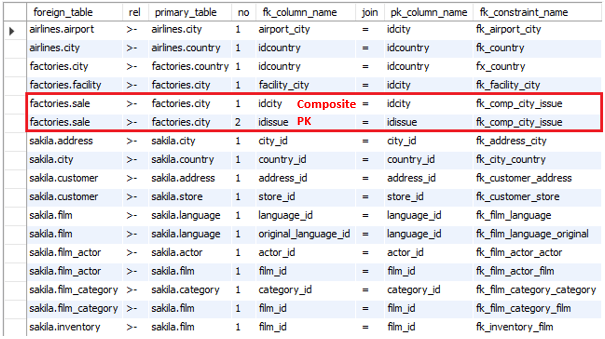The query below returns the foreign key constraint columns defined in the user databases (schemas).
Query
select concat(fks.constraint_schema, '.', fks.table_name) as foreign_table,
'->' as rel,
concat(fks.unique_constraint_schema, '.', fks.referenced_table_name)
as primary_table,
kcu.ordinal_position as no,
kcu.column_name as fk_column_name,
'=' as 'join',
kcu.referenced_column_name as pk_column_name,
fks.constraint_name as fk_constraint_name
from information_schema.referential_constraints fks
join information_schema.key_column_usage kcu
on fks.constraint_schema = kcu.table_schema
and fks.table_name = kcu.table_name
and fks.constraint_name = kcu.constraint_name
where kcu.table_schema not in('information_schema','sys',
'mysql', 'performance_schema')
-- and fks.constraint_schema = 'database name'
order by fks.constraint_schema,
fks.table_name,
kcu.ordinal_position;
Note: if you need the information for a specific database (schema), then uncomment the table_schema condition and provide your database name.
Columns
- foreign_table - foreign table name with database (schema) name
- rel - relationship symbol implicating direction
- primary_table - primary (referenced) table name with database (schema) name
- no - id of the column in the key. Single column keys always have 1, composite keys have 1, 2, ... n for each column of the key
- fk_column_name - foreign table column
- join - "=" symbol indicating the joining operation for a pair of columns
- pk_column_name - primary (referenced) table column
- fk_constraint_name - foreign key constraint name
Rows
- One row: represents one foreign key column. If the foreign key is composed of several columns (composite key), each column appears separately
- Scope of rows: all foreign keys in a database (schema) and its columns
- Ordered by: foreign table database (schema) name, table name and column ordinal position in the key
Sample results












 Bart Gawrych
Bart Gawrych